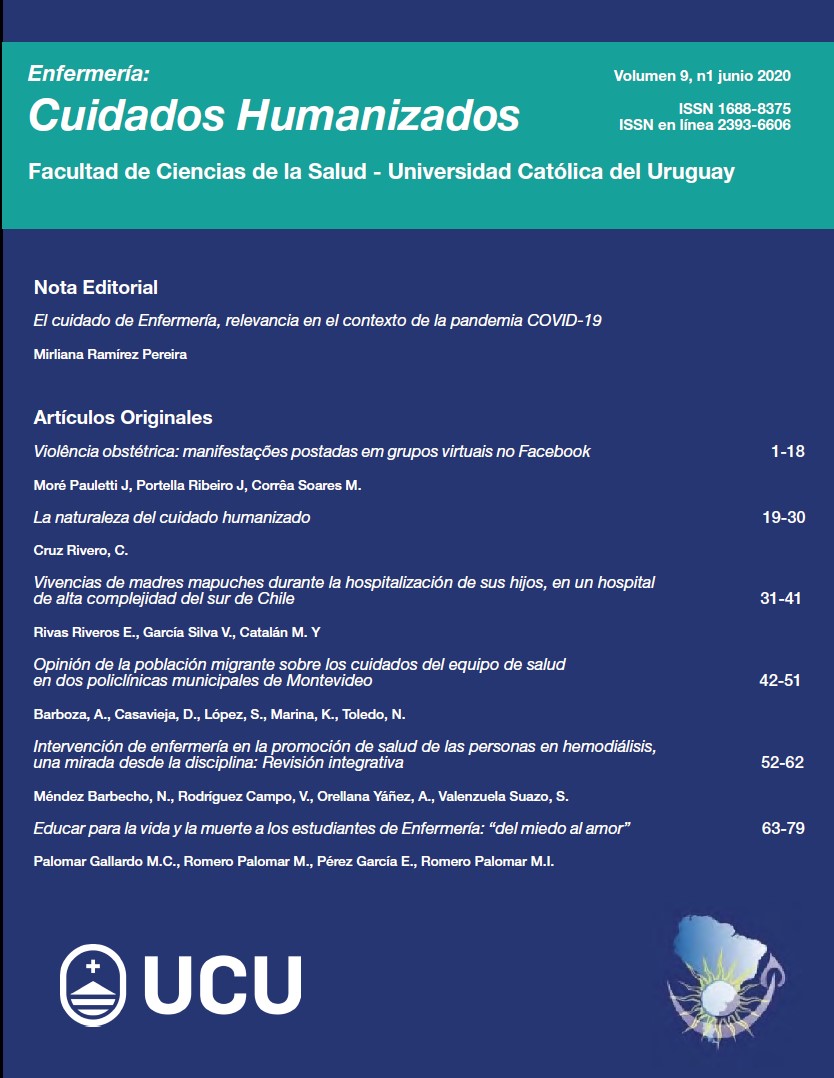Migrant population’s opinion on the healthcare team regarding patient care in two local outpatient clinics in Montevideo
DOI:
https://doi.org/10.22235/ech.v9i1.2165Keywords:
care, accessibility to health services, migrant, Cross-cultural NursingAbstract
This research aims to identify the opinion of the migrant population regarding patient care that eases their access to Public Healthcare Services. The target population is international migrants who attend two local outpatient clinics in Montevideo, Uruguay. The research is quantitative, descriptive and cross-sectional. Data collection was carried out through a survey, applied to 38 migrant users who were over 18 years old, with a minimum of three consultations carried out at the selected outpatient clinics. The socio-demographic profile showed a predominance of the age range between 28 and 38 years old (47.4%), the female gender (68.4%), countries from Latin America and the Caribbean (98.4%) and a higher education level (63.8%). Regarding patient care, 92.1% of respondents reported feeling the attention was suitable at the outpatient clinics and 100% stated they desired to continue attending. The most helpful types of patient care regarding access improvements were those related to communication (97.4%) and the quality of advisory services (89.5%). Cultural care - defined as the Healthcare Team's interest in the patient’s culture and beliefs- proved to be the least prevalent with 41.2% and 62.5% negative responses, respectively.
Downloads
References
(2) República Oriental del Uruguay. Ministerio de Relaciones Consulares. Dirección General para Asuntos Consulares y Vinculación. Informe anual 2018 Residencias permanentes de nacionales del Mercosur y familiares de uruguayos en el extranjero. Ley 19254. [Internet]. 2019. [consulta: 16 14 abr 2020]. Disponible en: http://www.jnm.gub.uy/images/documentos/Informe_Residencias_2018_MRREE.pdf
(3) República Oriental del Uruguay. Dirección Nacional de Migraciones. Anuario 2017. [Internet]. 2018. [consulta: 14 abr 2020]. Disponible en: https://migracion.minterior.gub.uy/images/anuario17/09-RESIDENCIAS_2017.pdf
(4) República Oriental del Uruguay. Dirección Nacional de Migraciones. Anuario 2019. [Internet]. 2020. [consulta: 14 abr 2020]. Disponible en: https://migracion.minterior.gub.uy/images/anuario19/ANUARIO_2019.pdf
(5) Alto Comisionado de las Naciones Unidas para los Refugiados. Tendencias globales. Desplazamiento forzado en 2018. [Internet]. 2019 [consulta: 14 abr 2020]. Disponible en: https://acnur.org/5d09c37c4#_ga=2.233805273.673666459.1582926104-412249149.1577814855
(6) República Oriental del Uruguay. Migración. Ley Nº 18.250 de 17 enero de 2008. [Internet]. 2008 [consulta: 30 ago 2017]. Disponible en: https://www.oas.org/dil/esp/Ley_Migraciones_Uruguay.pdf
(7) Administración de los Servicios de Salud del Estado. Afiliación de extranjeros y retornados al país. [Internet]. 2018 [consulta: 03 may 2020]. Disponible en: http://afiliaciones.asse.com.uy/prestaciones_detail?id=P-5-extranjeros
(8) Administración de los Servicios de Salud del Estado. Datos de Usuarios: total del país de usuarios ASSE, por tipo de cobertura según sexo y grupos de edad. [Internet]. 2016 [consulta: 14 abr 2020]. Disponible en: file:///C:/Users/Usuario/Downloads/2018_12_Diciembre.pdf
(9) Díaz CG. Tradiciones y costumbres caribeñas. [Internet]. 2012 [consulta: 10 jul 2018].
. Disponible en: https://enciclopediapr.org/encyclopedia/tradiciones-y-costumbres-caribenas/
(10) Organización Mundial de la Salud. Determinantes sociales de la salud: los hechos irrefutables. [Internet]. 2003 [consulta: 30 jul 2018]. Disponible en: https://escpromotorasdesalud.weebly.com/uploads/1/3/9/4/13940309/determinantes_sociales_de_la_salud._los_hechos_irrefutables.pdf
(11) Aguilar Palacio I., Carrera Las fuentes P., Rabanaque MJ. Salud percibida y nivel educativo en España: tendencias por comunidades autónomas y sexo (2001-2012). Gac Sanit [Internet]. 2015 [consulta: 10 jul 2018]; 29(1): 37-43. Disponible en: http://scielo.isciii.es/scielo.php?script=sci_arttext&pid=S0213-91112015000100007
(12) Organización Mundial de la Salud. A conceptual framework for action on the social determinants of health. [Internet]. 2007[consulta: 10 jul 2018]. Disponible en: www.who.int/social_determinants/resources/csdh_framework_action_05_07.pdf
Downloads
Published
How to Cite
Issue
Section
License
Copyright (c) 2020 Enfermería: Cuidados Humanizados

This work is licensed under a Creative Commons Attribution 4.0 International License.

















